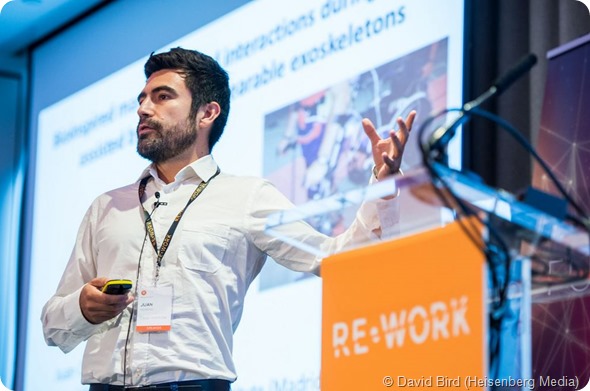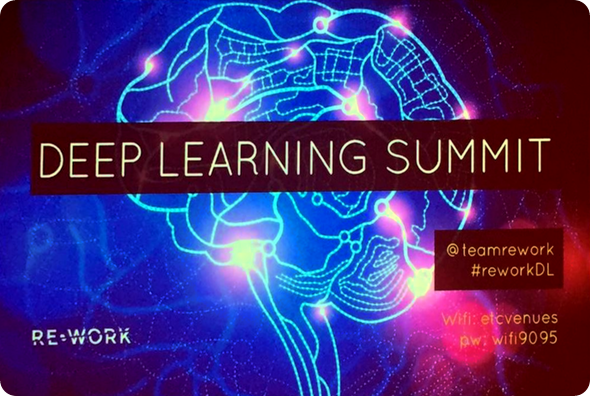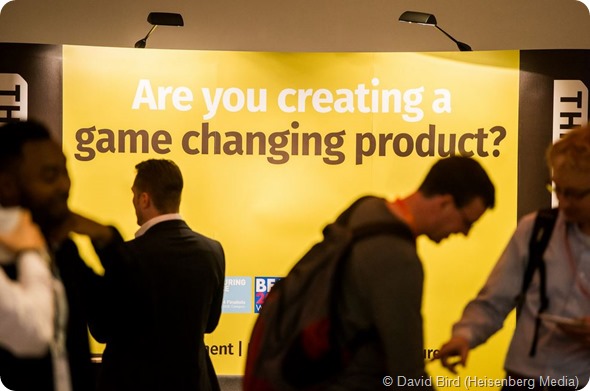The future of technological innovation is a broad topic with endless opportunities in every scientific field. RE.WORK’s two most recent concurrent conferences ‘RE.WORK: Future Technology’ and ‘RE.WORK: Deep Learning’, in part focussed on putting healthcare in the context of the wider technological revolution.
The latest technology presented at the conferences included many ways for patients and HCPs to transfer large portions of their work, be it physical or mental, over to technology, ranging from artificial intelligence that may revolutionize the way new drug candidates are discovered, to the new steps in wearable exoskeletons that are helping formerly immobilised patients to walk.
The lectures included novel ways that the boundaries of healthcare have been pushed, through crowd sourcing new nanoparticles with nano-medicinal properties, to creating affordable and accessible diagnostic tools that will greatly curb the prevalence of many easily curable diseases in hard to reach areas with low resources.
NanoDoc Introduction
Presenting the use of crowd sourcing to discover novel nanoparticles which could be used in applied nanomedicine, Dr Sabine Hauert, lecturer in swarm robotics at the University of Bristol, and her team have helped develop the game NanoDoc that allows users to create particles with different characteristics. In the game there are different types of cells, and the goal is to kill the ‘cancerous’ cells, while not harming the healthy cells with user designed nanoparticles.
The particles, cells and interactions between the two in the game are based on research from the field. But this game has proven to be a two way street. The novel ways that players have found to kill the virtual cancerous cells are now being followed up with research in the lab, to see if their real life counterparts work in a similar way and can be used as a viable anti-cancerous treatment.
Plans to crowd source better treatment modalities by providing people in developing countries with affordable and accessible diagnostic tools were presented with fascinating lectures from Elaine Warburton OBE, CEO of QuantuMDx and by Dr Mario Giardini, lecturer at the University of Strathclyde.
Elaine Warburton, QuantuMDx - RE.WORK & #BehindTheFace
The future of healthcare may be a portable molecular lab with in-built sequencing, the Q-POC handheld laboratory, which soon may be able to run molecular diagnostics in ten minutes. The diagnostic data is then transmittable to your local GP or healthcare network. The patient doesn’t need to leave their home to be diagnosed or prescribed medicine, stopping the spread of disease. The portability means that these handheld labs could be essential diagnostic tools in developing countries, combatting the spread of diseases such as TB, HIV and malaria.
If these devices become widespread, their global connectivity through the internet could see a new approach to epidemics. Patients that are diagnosed with a new, potentially dangerous strain of disease using the Q-POC would be able to transmit their condition to national and international health networks like the WHO, government agencies and their local healthcare network. Knowing that there is a new potentially virulent strain of a disease, the area could be quarantined. According to Elaine, if the Q-POC had been available, it could have limited disaster cases such as Ebola, bird and swine flu.
Similarly, there are already easily avoidable conditions that plague developing countries and need innovations in accessible diagnostic tools. One example is avoidable blindness, there are 39 million blind people in the world, with the majority in developing countries and 80% of these are avoidable. This is primarily due to the lack of ophthalmologists and optometrists in these countries to provide basic treatment to prevent people becoming blind.
In Africa there are more people with mobile phones than there are people with running water, so the technology is extremely accessible. Speaking at RE.WORK's future technology conference, Dr Giardini’s team have been developing ‘Peek, the portable eye examination kit’. Peek consists of an app and a low cost clip on adapter which allows people with a small amount of training to perform eye examinations anywhere, from surgeries to patients’ homes.
It’s easy to use, so much so that on a recent trip to Kenya Dr Giardini’s team examined 21,000 people in only 9 days! The examinations are geotagged in an attempt to keep health records and are completed within healthcare frameworks that can treat the patients after they have been diagnosed. The team hopes to produce a version of the app, accessible to people in the worst affected areas that will allow them to take better care of their eyes and seek treatment when necessary.
From small crowd based technology to big technology, there is a wealth of research being done to help patients. Juan Moreno, Coordinator at the Bioengineering Group is working on the BioMot project to exploit dynamic sensory-motor interactions to develop symbiotic exoskeletons that have better walking pace and stride, which will in the future allow patients with partial or full paralysis caused by spinal damage unrestricted access to everyday environments.

Demonstrating the latest developments in wearable exoskeleton technology, Juan Moreno showed us the benefits in rehabilitation and prosthetics that could be achieved by combining biomechanical principles, spatio-temporal processing and cognition aspects to positively co-adapt humans and wearable robots.
The conferences had a large emphasis on the importance of software, in particular using deep learning as a means to combat a wide range of challenges facing scientists and engineers that have increasing amounts of complex data, often spread across a wide range of sources. These challenges can often cause a bottleneck of information within industry. Information that is needed to make the next leap forward.

The challenge of finding high quality drug candidates, that drug discovery in the pharma industry faces, is throttling the potential for innovation and contributing to the average cost of a new licenced drug being several millions of dollars, according to Forbes.
One of the major costs is the R&D channelled into discovering a new drug compound. It’s clear to see that there’s a world of potential if we could streamline drug discovery by finding new and better quality leads, faster between compounds already being researched.
Highlighted at this year’s ‘Deep Learning’ conference, the team at Bioinformatics are developing a program that will crawl the current data being published in medical journals and create connections between drugs and conditions.
This programme uses deep learning to be taught how to react to different data and to create mind maps of potentially useful connections, which qualified researchers can then evaluate and follow up, potentially minimizing the R&D resources needed, by focussing on higher quality leads.
The discussions at the conferences focussed not only on HCP and research teams but also included a range of inventions focussed primarily for consumer interaction. The new direction that Bupa and the Global Institute for Digital Health Excellence are aiming to take by using a deep learning platform as a digital health aid and personal nutritionist.
Their system uses a healthcare suite that can be used to log the nutritional value of food, with a system that can be ubiquitously used across all foods and a programme that will be able to learn about the user.
Bupa are developing a user friendly interface that can encourage the user as a personal nutritionist, with easy to understand scores out of ten that let consumers know how good a food is, but with the flexibility to occasionally let users cheat on their diets, as it takes an approach that looks at the bigger nutritional picture. Bupa are developing an all-encompassing system to improve a consumer’s health, and while only in the early stages, it’s an exciting idea that may become a universal tool.

The future of medical technology looks bright, with ideas that affect every corner of medicine and will positively benefit more people in need than ever before. There are plenty more challenges ahead, which will give RE.WORK a host of interesting innovations to present in upcoming conferences. Their next conference ‘RE.WORK: Deep Learning in Healthcare’ looks to do just that. While there are still challenges to overcome, the pace of global medical innovation will remain unrelenting.